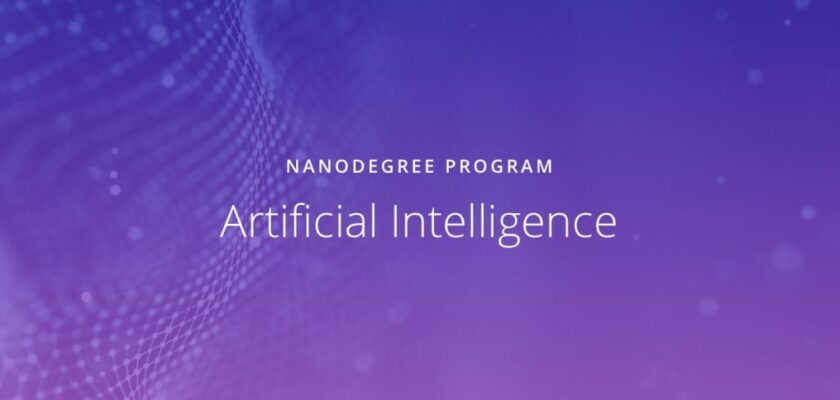Download and Learn Expand Your Knowledge of Artificial Intelligence (AI) Udacity Nanodegree Course 2023 for free with google drive download link.
What You’ll Learn in Expand Your Knowledge of Artificial Intelligence Nanodegree
Learn Foundational AI Algorithms
Prerequisite Knowledge
This program requires experience with linear algebra, statistics, and Python (including object-oriented programming).
- Basic knowledge of linear algebra and calculus.
- The ability to apply basic probability and statistics.
- Programming experience in Python.
- Experience implementing computer science algorithms and object-oriented programming.
- The ability to run programs and interpret output from a command line terminal or shell.
- You will also need access to a Windows, macOS, or Linux computer with Python 3.4 or later installed, and admin permissions to install new programs.
Introduction to Artificial Intelligence
In this course, you’ll learn about the foundations of AI. You’ll configure your programming environment to work on AI problems with Python. At the end of the course you’ll build a Sudoku solver and solve constraint satisfaction problems.
Project – Build a Sudoku Solver
Humans use information about problems to limit the solutions they consider. In this project you’ll use a technique called constraint propagation, combined with basic search, to develop a program that can efficiently solve any Sudoku. These ideas appear throughout AI, and the same techniques have been extended and applied to diverse problems in bioinformatics, logistics, and operations research.
Classical Search
In this course you’ll learn classical graph search algorithms–including uninformed search techniques like breadth-first and depth-first search and informed search with heuristics including A*. These algorithms are at the heart of many classical AI techniques, and have been used for planning, optimization, problem solving, and more. Complete the lesson by teaching PacMan to search with these techniques to solve increasingly complex domains.
Automated Planning
In this course you’ll learn to represent general problem domains with symbolic logic and use search to find optimal plans for achieving your agent’s goals. Planning &
scheduling systems power modern automation & logistics operations, and aerospace applications like the Hubble telescope & NASA Mars rovers.
Project – Build a Forward Planning Agent
Intelligent agents are expected to act in various domains, and automatically develop plans to achieve their goals. In this project you’ll build a system that can use symbolic logic and search to develop an optimal plan for achieving a set of goals. Planning and scheduling systems power automation and logistics operations, and aerospace applications like the Hubble telescope and NASA Mars rovers.
Optimization Problems
In this course you’ll learn about iterative improvement optimization problems and classical algorithms emphasizing gradient-free methods for solving them. These techniques can often be used on intractable problems to find solutions that are “good enough” for practical purposes, and have been used extensively in fields like Operations Research & logistics. You’ll finish the lesson by completing a classroom exercise comparing the different algorithms’ performance on a variety of problems.
Adversarial Search
In this course you’ll learn how to search in multi-agent environments (including decision making in competitive environments) using the minimax theorem from game theory. Then build an agent that can play games better than any humans.
Project – Build an Adversarial Game Playing Agent
AI agents acting in the real world have to “hope for the best, but prepare for the worst.” In this project you’ll write an agent that can play games with super-human performance in an adversarial environment. The principles of adversarial search provide a foundation for autonomous agents acting in the real world, and for understanding modern advances in AI like DeepMind’s AlphaGo Zero.
Fundamentals of Probabilistic Graphical Models
In this course you’ll learn to use Bayes Nets to represent complex probability distributions, and algorithms for sampling from those distributions. Then learn the algorithms used to train, predict, and evaluate Hidden Markov Models for pattern recognition. HMMs have been used for gesture recognition in computer vision, gene sequence identification in bioinformatics, speech generation & part of speech tagging in natural language processing, and more.
Project – Part of Speech Tagging
Pattern recognition is a common task for AI agents as they interact with the world. In this project you’ll perform pattern recognition using a Hidden Markov Model (HMM) for speech tagging, a common pre-processing step in Natural Language Processing. HMMs have been used in NLP tasks like tagging, sp
Expand Your Knowledge of Artificial Intelligence Nanodegree Free Download Link:

